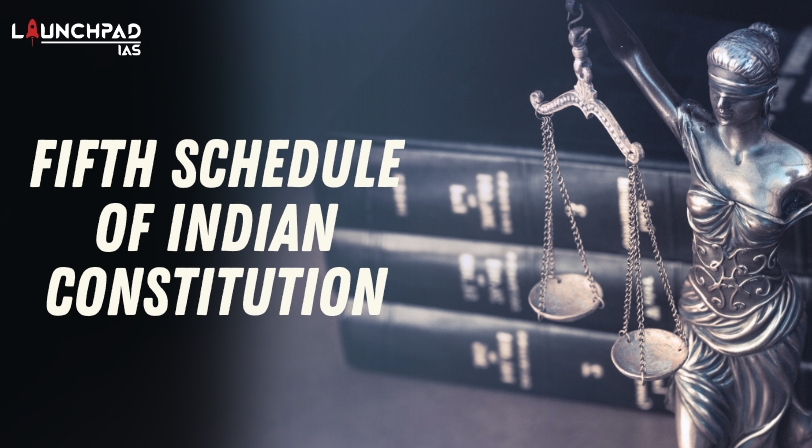What is the Fifth Schedule of the Indian constitution, and its criteria?
The Fifth Schedule of the Indian Constitution deals with provisions related to the Administration and control of Scheduled Areas and Scheduled Tribes.
Criteria
The Dhebar Commission (1960-61), laid down the following criteria for declaring any area as a ‘Scheduled Area’ under the Fifth Schedule:
- The preponderance of tribal population, should not be less than 50 percent.
- Compactness and reasonable size of the area.
- Underdeveloped nature of the area.
- The marked disparity in the economic standard of the people as compared to the neighboring Areas.
Later, a viable administrative entity, such as a district, block, or taluk, has been also identified as an important additional criterion. According to the Ministry of Tribal Affairs, these criteria are not spelt out in the Constitution of India but have become well established.
What are the provisions of the Fifth Schedule?
The Fifth Schedule of the constitution deals with the management and administration of Scheduled Areas and Scheduled tribes where tribal groups predominate.
- Article 244(1): The provisions of the Fifth Schedule shall apply to the administration and control of the Scheduled Areas and Scheduled Tribes in any State other than the States of Assam, Meghalaya, Tripura, and Mizoram.
- Declaration of Scheduled Areas:
- The President of India is empowered to declare an area a Scheduled Area. He can direct that the whole or any specified part of a Scheduled Area shall cease to be a Scheduled Area.
- The President can increase or decrease the area of any Scheduled Area in a State after consultation with the Governor of that State and also alter its boundary lines but only by way of rectification of boundaries.
- Executive power of State and Centre:
- The executive power of a State extends to the Scheduled Areas therein.
- The Governor of each State having Scheduled Areas shall make a report to the President regarding the administration of the Scheduled Areas in that State.
- The executive power of the center extends to giving directions to the State regarding the administration of such Areas.
- Tribes Advisory Council (TAC):
- A Tribes Advisory Council has to be established in each State, having Scheduled Areas to deal with the welfare and advancement of Scheduled tribes in states.
- A similar council can be established in any State having Scheduled Tribes but not Scheduled Areas if the President directs.
- It consists of a maximum of 20 members. Three-fourths of the members should be representatives of Scheduled tribes in the State legislative assembly.
- The Governor may make rules
- Regarding the number of members of the Council.
- The mode of their appointment and the appointment of the Chairman of the Council and of the officers and servants thereof.
- The conduct of its meetings and its procedure in general, all other incidental matters.
- Law applicable to Scheduled Areas:
- The Governor is empowered to direct that any particular act of Parliament or of the State legislature does not apply to a Scheduled Area or any part or shall apply with specified modifications and exceptions.
- The Governor is empowered to make regulations for the peace and good government of a Scheduled Area after consulting the Tribes Advisory Council. Such regulations may
- Prohibit or restrict the transfer of land by or among members of the Scheduled Tribes in such Areas.
- Regulate the allotment of land to members of the Scheduled Tribes in such Areas.
- Regulate the carrying on of business as money-lender by persons who lend money to members of the Scheduled Tribes in such Areas.
Other Provisions
- Panchayat (Extension to Scheduled Areas) Act, 1996
- The Fifth Schedule Areas are exempt from the Panchayat-related requirements of Part IX of the constitution. The Panchayat (Extension to Scheduled Areas) Act, 1996, was passed by Parliament to extend the provisions of Part IX to the fifth Scheduled area with certain modifications.
States having Fifth Schedule Areas
The Fifth Schedule provides for the administration of tribal Areas in ten states in India, including Andhra Pradesh, Chhattisgarh, Gujarat, Himachal Pradesh, Jharkhand, Madhya Pradesh, Maharashtra, Odisha, Rajasthan, and Telangana.


